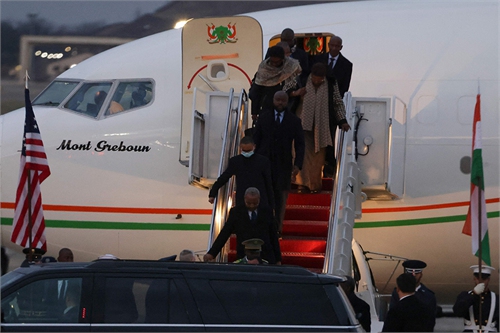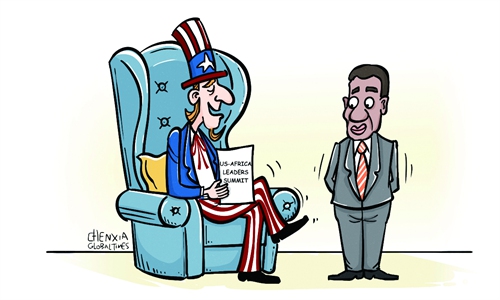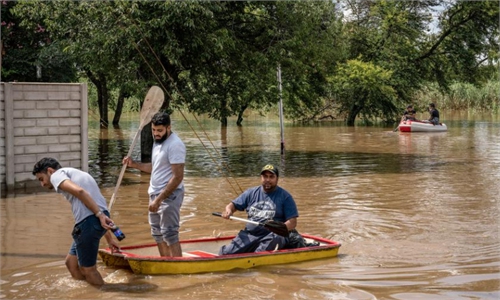
Pedestrians cross Adderly Street in central Cape Town, South Africa, on January 11, 2021. Photo: VCG
The Biden administration has invited 49 African leaders to Washington to attend the US-Africa summit that opens on Tuesday. This is the first time the US has restarted this mechanism in eight years. Besides a high-profile briefing, US President Joe Biden is scheduled to announce at the US-Africa summit that the US supports the African Union's entry into the G20, vigorously promoting the US-Africa partnership. While strongly criticizing the Trump administration for neglecting Africa, the Biden administration emphasized that it will ramp up efforts to promote the US-Africa partnership. However, no matter how high-profile its media propaganda is, it is only a prescribed action of the US diplomatic state, and cannot conceal the essence that the US views Africa's development issues from a political perspective.
The US strongly urges the African Union to move closer to the US politically. A week ago, the White House revealed that Biden plans to announce at the US-Africa summit that "it's past time Africa has permanent seats at the table in international organizations and initiatives," White House adviser Judd Devermont said on Friday, adding that the US needs more African voices in international conversations that concern the global economy, democracy and governance, climate change, health and security, according to media reports. It seems that the US is trying to highlight its support for Africa's participation in global governance, but it is actually not the case.
The G20 in its current form is a gathering of major developed economies and emerging market economies. It is currently the most effective platform for global economic governance in the wake of the global financial crisis in 2008. South Africa is the only African representative in this group. The joining of the African Union is of course a good thing, and it was also supported by emerging countries such as China and Indonesia. Yet, the US is now announcing its supports for the African Union out of other considerations.
In the context of the prevalence of global protectionism, isolationism and a Cold War mentality in US diplomacy have gradually gained the upper hand. Dealing with African issues has also reproduced elements of strategic competition seen during the Cold War, regarding China and Russia as major competitors, and asking African countries to side with the US. Africa, on the other hand, has its own diplomatic considerations. The half century of US-Africa exchanges has not helped Africa substantively solve its development problems. Therefore, Africa has not closely followed the US in its stance on some issues.
For example, in recent statements about the Russia-Ukraine conflict, many African countries refused to follow the West in seeking to isolate Russia. Some African countries also ignored the warning issued by the US "not to engage in economic cooperation with Russia." Based on this, the US has no choice but to strengthen its political influence in Africa. The "US Africa Strategy" announced in August 2022 for the first time emphasized the importance of Africa's voting rights to the US. Supporting the African Union to join the G2O is a substantive step for African countries to choose sides in terms of international security, international structure, and major power competition.
It is still difficult for the US to place a neccesary focus on Africa's development demands. Although this summit took a lot of efforts in setting the agenda, it focused on development issues such as public health and climate change, and avoided mentioning "competitors" in the 34-page summit draft agenda, where China does not appear and Russia is mentioned only twice, which shows that the US does not want to aggravate the resentment among African countries that they are regarded as pawns by the US. A senior White House official said the US' goal is not to focus the conversation on competition or confrontation with other countries. This is not the best way to promote American interests and the common goals of the US and Africa. But there is intense debate at the top levels of US diplomacy over the issue.
Although the topics of the summit focus on the development agenda, they are superficial, and the US has no time to care about the development plight of African countries. Despite the imminent summit, Biden has yet to schedule a bilateral meeting with any of the African leaders, according to media reports. A person familiar with the administration's discussions reportedly said the White House was concerned that organizing the meeting would create friction because of the sheer number of visiting African leaders and the inability to accommodate everyone's meeting requests.
Obviously, the differentiated development demands of African countries cannot win the favor and direct support of Biden, and therefore have been severely criticized by African countries. For example, a South African think tank recently published a report criticizing successive US governments for never taking practical measures to help Africa cope with development challenges.
African countries have long been familiar with the nature of strategic competition when it comes to the continent. Due to the political pressure of the US, the 49 African countries can only accompany the US to complete the diplomatic show and will not hold high expectations for the summit.
However, it is self-evident that the US strategy toward Africa will further exacerbate development risks in Africa. Africa has been against the US' "political siding" for a long time. Western countries have always unilaterally dragged them into "geopolitical confrontation" with China and Russia, either forcing African countries to abandon so-called "problematic" and "dangerous" Chinese infrastructure investments, or concocting "debt traps."
This is even worse for Africa, which is currently suffering from the impact of the COVID-19 epidemic. The US strongly demanded that China reduce or cancel the debts of underdeveloped countries, but at the same time, it did not increase its support for Africa's development. As a result, African countries had to go to international capital markets for loans, resulting in a more serious debt burden. How Africa, whose development demands are politicized by the US can control its own destiny is a thorny issue leaders of African countries face today.
The author is professor with School of International Relations and Diplomacy, Beijing Foreign Studies University. bizopinion@globaltimes.com.cn



